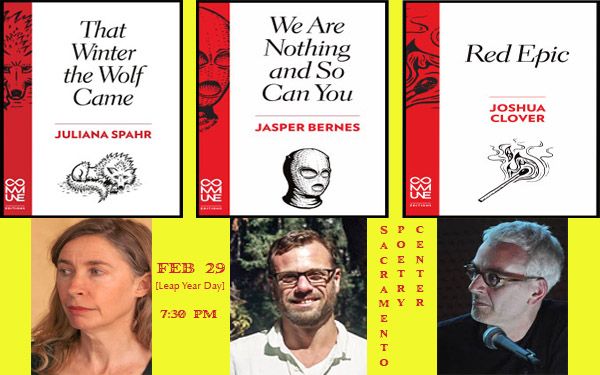A Commune Editions Reading:
publishing poetry for reading and writing explicitly against the given world, always aware that it begins inside that world
Jasper Bernes, Juliana Spahr, and Joshua Clover
Monday, Feb. 29 (Leap Year Day) 2016 at 7:30
1719 25th Street
Host: Tim Kahl

Jasper Bernes was born in Southern California and is the author of We Are Nothing and So Can you (Commune Editions, 2015) and Starsdown (Ingirumimusnocteetconsumimurigni, 2007). He currently teaches at UC Berkeley in the English Department. In 2012 he was sentenced to 30 days of community service for his part in the Occupy Cal protests. He is currently completing a book manuscript, The Work of Art in the Age of Deindustrialization, about the role that literature and art play in the postindustrial restructuring of labor.
from We Are Nothing and So Can YouAs for the rest of us, we learnsomething important about ourselveswatching from the loading dockas the mushroom cloudannounces the end of another season —e.g., that each riot really isan assemblage of other riotswashed up on the boulevards,from whose faded corpsesone dresses and arms one’s comradesthe total inadequacy of whichas equipment for the task at handtraces out in negativethe seat perilous of the party historicalthe poetry of the futurewhose sweet new soundswill fill with meaning slowlywhile the seas rise.
Joshua Clover is the author of six books, three poetry — Red Epic (Commune Editions, 2015), The Totality for Kids (University of California, 2006) and Madonna anno Domini (Louisiana State University, 1997) and three cultural theory — Riot.Strike.Riot (Verso, 2016), Bob Dylan Didn’t Have This to Sing About (University of California, 2009) and The Matrix (2006). Clover is a professor of English and comparative literature at the University of California, Davis, and a columnist for The Nation and Ny Tid [New Time], in Norway.
Tranche II have lived through the end of syntax I have lived though the imperial grammars I have lived through the bursting of a bubble visible from space I have lived through the suicide of money to preserve the life of value I have lived through the fatal sacrifice of philosophy to avoid the jaws of the dialectic I have watched the spiral of Vico become the spiral of Sismondi and then watched that become le vrai viral livre I have stood atop a small hill with Mallarmé in one hand and in the other a cognitive balm and of what virtue were our pretty phrases against a thousand beautiful men standing in rank near the sunlit shore
Born in Chillicothe, Ohio Juliana Spahr is the author of That Winter the Wolf Came (Commune Editions, 2015) Well Then There Now (Black Sparrow Press, 2011); This Connection of Everyone with Lungs (University of California Press, 2005); Fuck You — Aloha — I Love You (Wesleyan University Press, 2001); and Response (Sun & Moon Press, 1996), winner of the National Poetry Series Award. She currently lives in Berkeley, California, teaches at Mills College and with Joshua Clover is the co-founder of the 95-cent Skool. Her work often features a connection between the personal and the poetical. She is an anxious parent.
an excerpt from “It’s all Good, It’s All Fucked”It’s all good, I would say, it’s all fucked. And then I would breathe. And then, again, it’s all good; it’s all fucked. Again, breathe. And then, it’s all good; it’s all fucked. Breathe again. I might do this while walking. Or while driving in the car. Or while lying down, before taking a nap.It was Non-Revolution. Or it was me. Or it was Non-Revolution and me. I was unsure what it really was. Maybe it was my thoughts. My thoughts at one minute about Non-Revolution. About the smell of Non-Revolution. Sweat, urine, sage, pot, rotting food, hay, all mixed together. Perhaps about Non-Revolution’s body. I am sure I am not the only one who has thought it exceptional, but I am also just sure that by the standards of bodies, Non-Revolution’s fine but not exceptional. That is the point. That is why Non-Revolution is called Non-Revolution, why they have revolution as a possibility in their name but it is a modified and thus negated possibility so as to suggest they are possibly neither good nor fucked.Still something about Non-Revolution’s smell and body had gotten into me. It was thin except when it was not. And not slight except when it was. It had this odd patch of hair on its lower back. Except when it didn’t. And it tasted slightly sour, off. Except when it was sweet, on. At any moment though, to me, it was like something so excellent I could not get enough of it.




